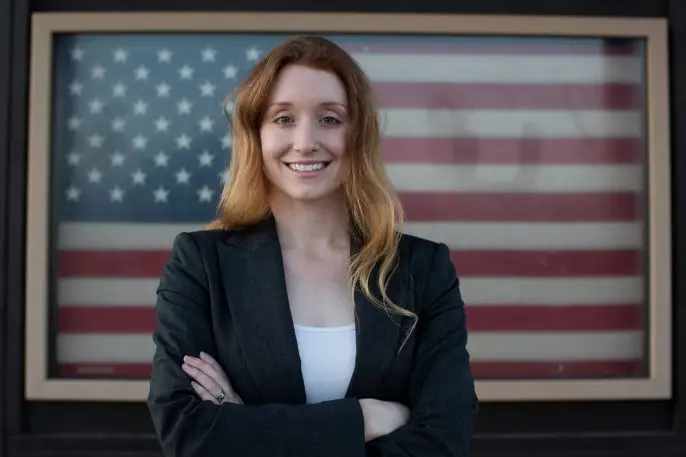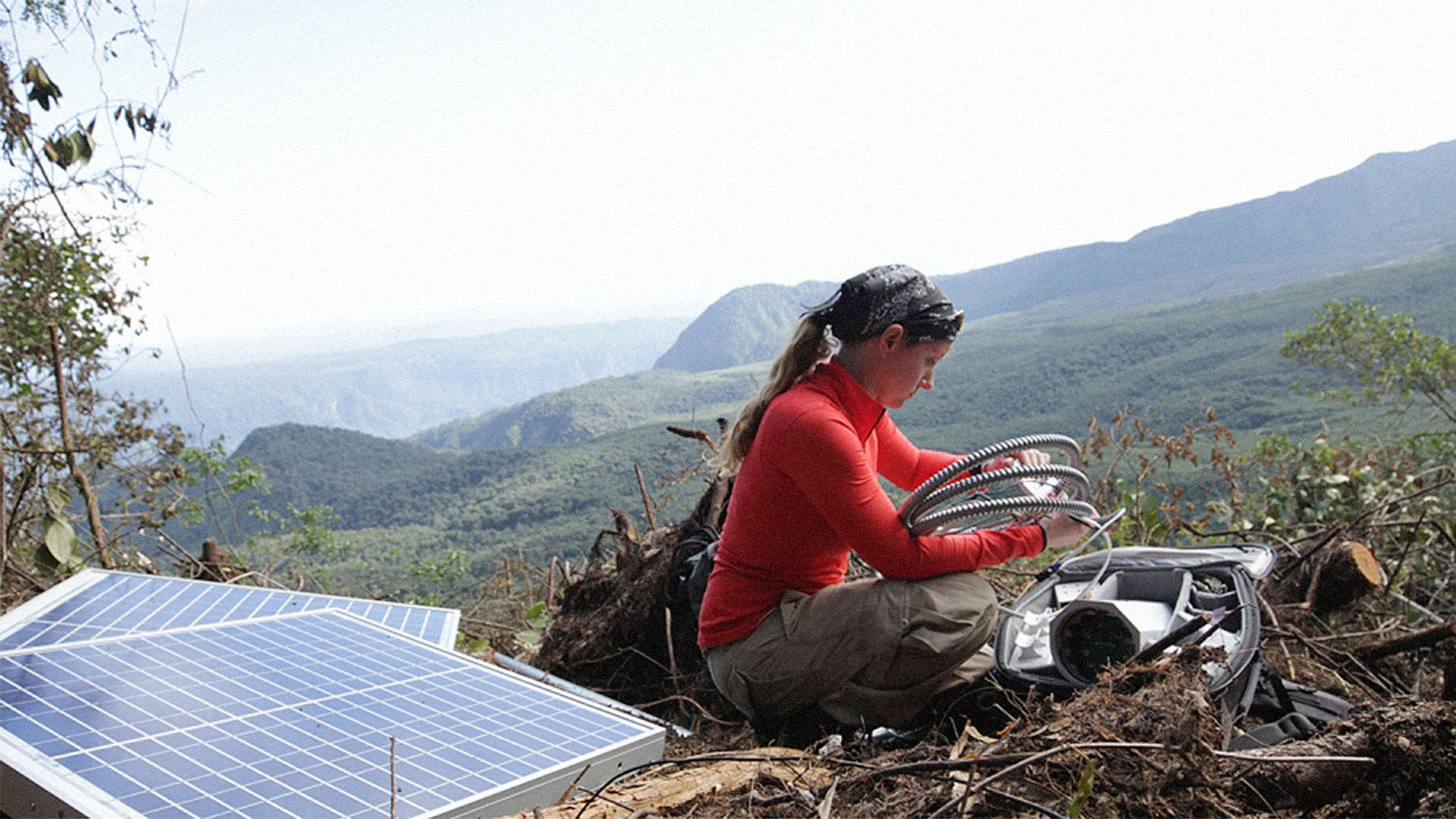The average Congressperson is 57 years old, male, and a lawyer or a businessman by training. Jess Phoenix is none of those things. She’s a volcano scientist in her mid-thirties who also founded the education and research nonprofit Blueprint Earth to document each of Earth’s seven biomes–from desert to grassland to tundra–in minute detail. She’s done firsthand research on volcanoes in Iceland and Hawaii; she’s seen an avalanche start in Peru when a sheet of ice cracked off the side of a mountain. Under her long red hair, she wears the sides of her head buzzed. She identifies as queer. Usually, you can find her in jeans and cowboy boots. On her ranch, she rescues and retrains former racehorses.
And on April 17 of this year, Phoenix announced her candidacy for the congressional seat in California’s 25th district, a part of northern Los Angeles that comprises well-off towns like Santa Clarita and sprawling ranchlands. The district’s incumbent candidate is Steve Knight, a Republican with a 0% lifetime score on environmental issues from the League of Conservation Voters. With southern California particularly plagued by droughts associated with climate change–and currently being ravaged by horrific wildfires–the district’s lack of leadership on the environment has troubled Phoenix. “I’ve always had a motivation to do things right, and to do things that have value for people,” Phoenix tells Fast Company. And as a scientist in the Trump era, doing the right thing, for Phoenix, means running to combat the strain of anti-intellectualism and alternative facts snaking through the federal government.

But Phoenix recognizes that beyond the barriers of her age and her gender, her profession presents another stumbling block along the campaign trail. Back in February, Shaughnessy Naughton, a trained chemist who twice ran (unsuccessfully) for Congress in Pennsylvania’s 8th district, told Fast Company that “for scientists, the mindset has always been that science is above politics, and that scientists should be above getting involved in politics.” That is no longer a mentality that obtains. Like Phoenix, Naughton was rattled by the current administration’s assault on the truth and founded the nonprofit 314 Action to support and encourage more scientists to run for office. “We’re seeing politicians meddle in proven science, and we need to push back against that,” she said.
But 314 Action, which has supported Phoenix’s campaign, only launched this year; as of now, there’s only one scientist–a physicist–in Congress. “That’s all theoretical,” Phoenix says. “It’s a big problem that field science and environmental science isn’t represented at all,” she says. “We need people that actually study the effects of climate change.” She has: Phoenix has traveled to the Grand Tetons to observe the rate of glacial retreat; she’s witnessed and collected data precisely around this issue. And while through her nonprofit, she was trying to lead the way to collect more research and data on Earth’s changing environments, she realized that “if we don’t have science funding–not just for research, but for innovation and R&D–we’re going to be screwed,” Phoenix says. And as someone with a say in policy decisions, she’s hoping to be able to advocate for more federal funding toward the sciences and green-tech innovation.
We saw as recently as last month’s election that pockets of the U.S. are ready to embrace unconventional candidates: Danica Roem, the first openly transgender candidate to run in the U.S., won a state legislature seat in Virginia; many other seats were filled by other first-time candidates of diverse backgrounds. But Phoenix knows she still faces an uphill battle against the establishment. Around seven other Democrats are jockeying for the CA-25 seat, and while only three, Phoenix included, are currently fundraising, her main opponent, Brian Caforio, ran and lost in the last election, and still has the fundraising networks in place to tap again for the current cycle. He also fits the bill for a Congressman: He’s white, middle-aged, and a Yale-educated lawyer.

Phoenix, on the other hand, says that the average donation to her campaign, through the platform Crowdpac, is around $46. “I’m bootstrapping the whole thing—it’s very grassroots,” she says. As of the last filing, she has raised $124,683.73 of the $4 million she estimates she’ll need. Phoenix is seeking endorsements from groups like the Sierra Club and League of Conservation Voters, as well as the Council for a Livable World, which focuses on disarmament. Phoenix studied strategic disarmament in school and answered the latter council’s questionnaire perfectly, but even so, she’s heard the same thing from all of them: Raise more money, then come back to us.
Which almost perfectly illustrates the difficulties of launching and carrying through a first-time campaign as someone outside the candidate norm: Just 0.53% of U.S. adults donate more than $200 to political campaigns or PACs, but that tiny fraction accounts for 68% of all individual campaign donations–which generally go toward establishment candidates. Opportunities for grassroots campaign fundraising, Phoenix is finding, are slim. “And it’s basically the early money that goes into campaigns that decides who makes it through,” she adds.
Though her opponents are currently out-raising her four-to-one, Phoenix is undeterred from furthering her campaign and has–perhaps unsurprisingly, given that she’s a trained volcanologist–garnered the support of several Star Trek actors like Robert Picardo (The Doctor on Star Trek: Voyager) and John Billingsley (Doctor Phlox on Star Trek: Enterprise). The actors live in Los Angeles and met Phoenix through her campaigning; they were energized, she says, by how her campaign aligned with Star Trek creator Gene Roddenberry’s vision for society. “Star Trek was all about diversity and inclusivity and anti-war and logic and facts,” Phoenix says. “And what I want is for everyone to live long and prosper.”
But for the time being, she’s focused on running to bring her rationality and facts-based work to the government–and hoping to make a statement about creating more opportunities for people with unconventional backgrounds to run. “We need to blow up the whole established way of doing things,” Phoenix says. “You should be able to say: ‘I’m inspired to serve our country and try to make it a better place, so I’m going to do it.'”
Recognize your brand’s excellence by applying to this year’s Brands That Matter Awards before the early-rate deadline, May 3.
